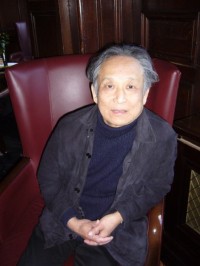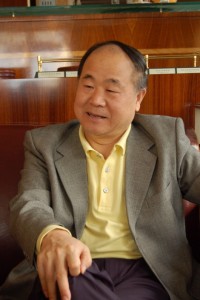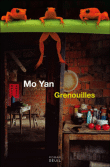Anne Sastourné is a publisher with the “Éditions du Seuil”, responsible for the Far East; she was kind enough to answer our questions.
Can one speak of an editorial policy?
At the Seuil, what matters is a literary quality and a certain intellectual level, it’s an opening line.
This sector Far East was built by my predecessor, Vincent Bardet, and I took over there about ten years ago. I have three different responsabilities: I am the secretary of the magazine “Powers” which deals with constitutional law, I am editor of “documents” and of the language area of the Far East. I publish a dozen books a year.
In our company, everything depends on the trust to our editorial choices; is this a book we like, this is the first question … My own work is complicated by the fact that I do not read the original languages; the next generation of publishers will be able, I hope, to read directly in Chinese or Japanese …
We do not exclude any theme, though I willingly do not publish historical novels especially concerning ancient China, for example.
 We do have expectations with young authors such as Liu Sola, but it is not always successful. But a publisher of our group “Les Editions de l’Olivier” was able to promote several young Chinese writers.
We do have expectations with young authors such as Liu Sola, but it is not always successful. But a publisher of our group “Les Editions de l’Olivier” was able to promote several young Chinese writers.
Literary prizes awarded in Asia do not play a role in our choice because they are unknown to the French public. “Editions du Seuil” have published many Nobel Prizes, and of course one could dream of a Nobel prize for Mo Yan after Gao Xingjian. Anyhow Mo Yan is part of the back list and his books sell well.
Are the French authorities supportive?
The Centre National du Livre (CNL) plays a very important since it supports 60% of the cost of translations. This is essential. To obtain its assistance, we must present a file which can be turned down if their budget is too limited or if their Board considers that the translation is of insufficient quality.
With the help of CNL, one can break even with 3 000 copies; without this support, we must at least double this number. For an unknown author, a run of 2500 is not negative. For Mo Yan it is much more and his best selling was “ Big breasts and wide hips ” … most likely because of the title!
Do you have agents in China?
In China, there are still relatively few agents and they are not always very professional, no one has approached us for novels up to now; Europeans agents did come to offer me essays already translated into English …
 In some cases, and especially for writers who have no agent, I obtain the European rights, but rarely the American or Japanese rights. Having the European rights can be interesting when the book sells well.
In some cases, and especially for writers who have no agent, I obtain the European rights, but rarely the American or Japanese rights. Having the European rights can be interesting when the book sells well.
I select the books with the help of my personal network and of translators; as I only publish four or five Asian novels a year, I do not really need someone to travel regularly to China, Korea or Japan on my behalf.
How do you choose the translators?
The ideal situation is to choose the translator according to the author and wait for the translator to be available to give him the book; in practice for Chinese, there are still too few experienced translators and they are very busy. For Mo Yan, we were able to translate the work regularly alternating Noël and Liliane Dutrait and Chantal Chen-Andro, well known translators who know the author and his work.
With no agents, I can better control the schedules of translations; agents, themselves, require publication delays usually too short, they only take into account the period needed for translation but not the editing. Moreover, in France, the schedules of releases are quite fixed, it is out of question to publish a major novel for Christmas or during summer, it is at the beginning of the year, or early September …
For translators of Asian languages, the price per page is around 22 to 25 euros for a page in French of 1500 characters. There is always also a royalty translation contract of 2%.
Should we criticize the “wild” editing work of American translators/ publishers?
This was done also in France for the first translations of Chinese novels when one thought that it was too difficult for the public. This is not the case any more, the readers are more experienced and prefer to read a text that reflects as accurately as possible the language and spirit of the original.
Americans are now often a few years backward from us, they still consider that their readers are not able to receive a text as it is, so they adapt. The agents are also doing the job of cutting and adaptation, they have to in order to sell the book to American publishers.
In the original version, the editing work in the usual sense has not generally been done in China; the translator and the editor, in agreement with the author, are doing part of this work.
This occurs regularly for essays, but it happens also very often for novels. We try to have the best possible text, but there is no question of an “adaptation” to the French public.
The notes are written by the translators according to the text and possibly specific demands of the editors.
French readers in contrast to the American public do not necessarily require some action or well defined characters. What may seem difficult is the contradiction and paradox of a text or a plot; the complexity plays a greater role in Asia, it is not explicit, it is much more natural. But readers do not mind – less and less.
Covers are important!
 The cover of “Frogs” by Mo Yan is of good quality in my opinion, it is perhaps a little less catchy than that of ” Life and death are wearing me out” but it is intriguing. The donkey of ” Life and death .. ” Is a real donkey and not a toy and it should be noted that there are people that do not bear animals, it is amazing but quite definite, so you will see few animals on the covers.
The cover of “Frogs” by Mo Yan is of good quality in my opinion, it is perhaps a little less catchy than that of ” Life and death are wearing me out” but it is intriguing. The donkey of ” Life and death .. ” Is a real donkey and not a toy and it should be noted that there are people that do not bear animals, it is amazing but quite definite, so you will see few animals on the covers.
The cover is specific to each book and to a country; we have great graphic designers and we spend a lot of time on this because it’s important. American or Japanese or Chinese covers are very different from ours and would not be adapted in France. Sometimes it’s hard to explain this diversity to Chinese authors who are, moreover, anxious not to have political elements or symbols on the cover.
Your profession and your colleagues in France and abroad …
With French colleagues, it is difficult to compare, some make a lot of purchases of rights, negotiations, and limited work on the text, others concentrate on the literary aspect, while others focus on the marketing – Each editor has his style and priorities.
At “Le Seuil”, we try to consider first the quality of the translation but we are working hard on the marketing, on the day to day selling, even if the building of a strong backlist that will last a long time and is for us very important.
The other major difference between France and abroad, as I said, is the action of agents. For Japan, agents have been there for a long time, on the American model. I hope there will be agents operating with China, even if direct selection of books is for us more interesting and better suited to our habits of relationship with authors (with French writers who rarely have agents, the contact author-editor is essential and very close). There should be more Chinese agents, who love and know their literature as well as that of the countries they are targetting; nowadays they are mainly English speaking.
Asian literature, including China, is much more developed in France than in the United States. Philippe Picquier opened a door, it is necessary that the major publishers are aware of the quality and the importance of this area. Very few publishers have an opening to Asia, and there will be plenty to do. Young editors familiar with Asia should appear gradually: this seems inevitable and highly desirable.
This sector will grow necessarily because of the economic weight of Asia and the importance of publishing and of the book industry in China.
Bertrand Mialaret





